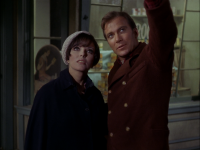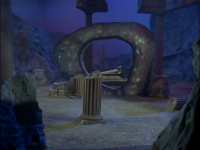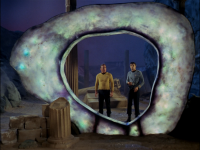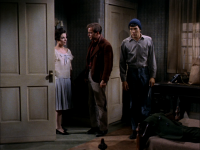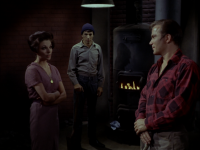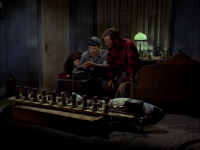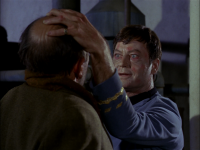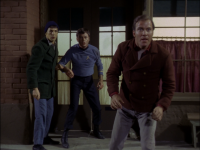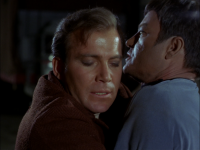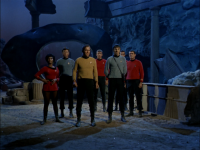Star Trek: The Original Series — 1x28 — The City on the Edge of Forever
Synopsis
Kirk and Spock go back in time to save McCoy.
Filler rating: not filler
Aside from being one of Star Trek's most famous episodes, this episode is also a prerequisite for watching TAS: Yesteryear.
Remarkable scenes
- The look on Sulu's face when he was injected with Cordrazine.
- Kirk and Spock questioning the Guardian of Forever.
- McCoy destroying history.
- Kirk trying to explain Spock to the police officer.
- Edith Keeler's speech: "One day soon man is going to be able to harness incredible energies. Maybe even the atom. Energies that could ultimately hurl us to other worlds in some sort of space ship. And the men that reach out into space will be able to find ways to feed the hungry millions of the world and to cure their diseases. They will be able to find a way to give each man hope and a common future."
- Spock discovering that Edith Keeler may be supposed to die.
- McCoy on a rampage.
- Spock proving Edith Keeler must indeed die.
- McCoy: "I'm a surgeon, not a psychiatrist." (Count #3 for "I'm a doctor, not a [blah]" style lines McCoy is famous for.)
- Edith Keeler's death and Kirk restraining himself from saving her.
Review
What if going back in time and saving one person from dying in a terrible tragedy led to an even greater tragedy for millions more people a short time later? The City on the Edge of Forever is not the first episode of Star Trek to deal with issues raised by contaminated timelines, but it's certainly the best one to tackle the issue so far as it features both excellent humor and a terrific dark dramatic story. The humor in McCoy's insane rampage, the drama in Edith Keeler's death, the dynamic nature of the storytelling, the unusual pacing, and the unusually high quality acting on the part of the main cast make this story easily among the most memorable episodes produced thus far.
Unlike previous dabbles into time travel storytelling such as Tomorrow Is Yesterday, this episode treats the implications of time travel notably more responsibly. Even little details such as Spock remarking on how much useful historical data he could collect using the Guardian of Forever are an excellent illustration of this, but no scene is more compelling in this respect than Keeler's death. Beyond the dramatic appeal, there is also time travel intrigue. She died crossing the street, trying to find out what Kirk, McCoy, and Spock (well maybe not Spock...) were all so happy about. Thus, they are the direct cause of her death! This episode didn't merely acknowledge the implications of a time travel paradox, it used one for dramatic effect!
Though no matter how captivating this story may be dramatically, it is not without its flaws. Chief among the issues in this story is the Guardian of Forever itself. What was it doing there? Why didn't they investigate it any further? Why did they just leave such a powerful and potentially dangerous piece of technology laying around there for anyone else to find and misuse in the way McCoy accidentally did? Why was the landing party insulated from the changes to the timeline? Did the Guardian of Forever protect them somehow due to their proximity to it? This episode definitely treated time travel more responsibly this time around, but still not responsibly enough for a perfect score I'm afraid. With more careful writing this episode certainly could have earned one.
